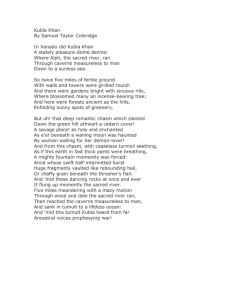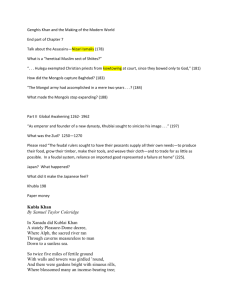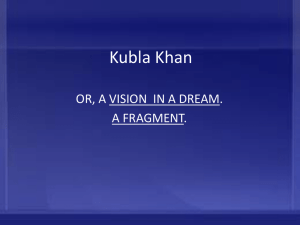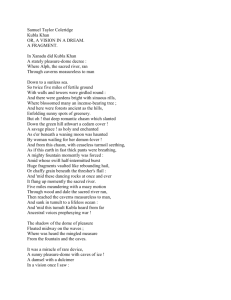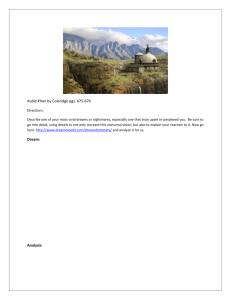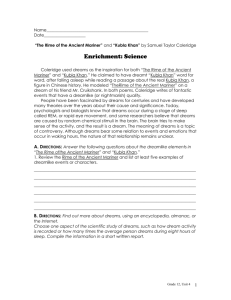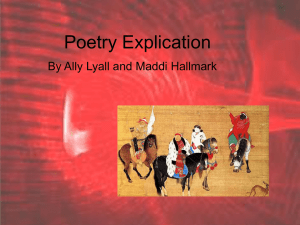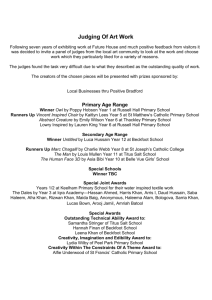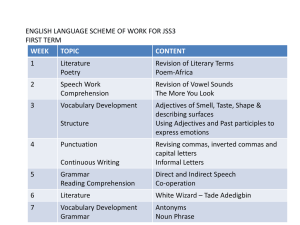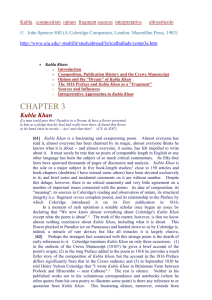Begonia Rudy Begonia Intro to Literature W554 Professor Farbman
advertisement
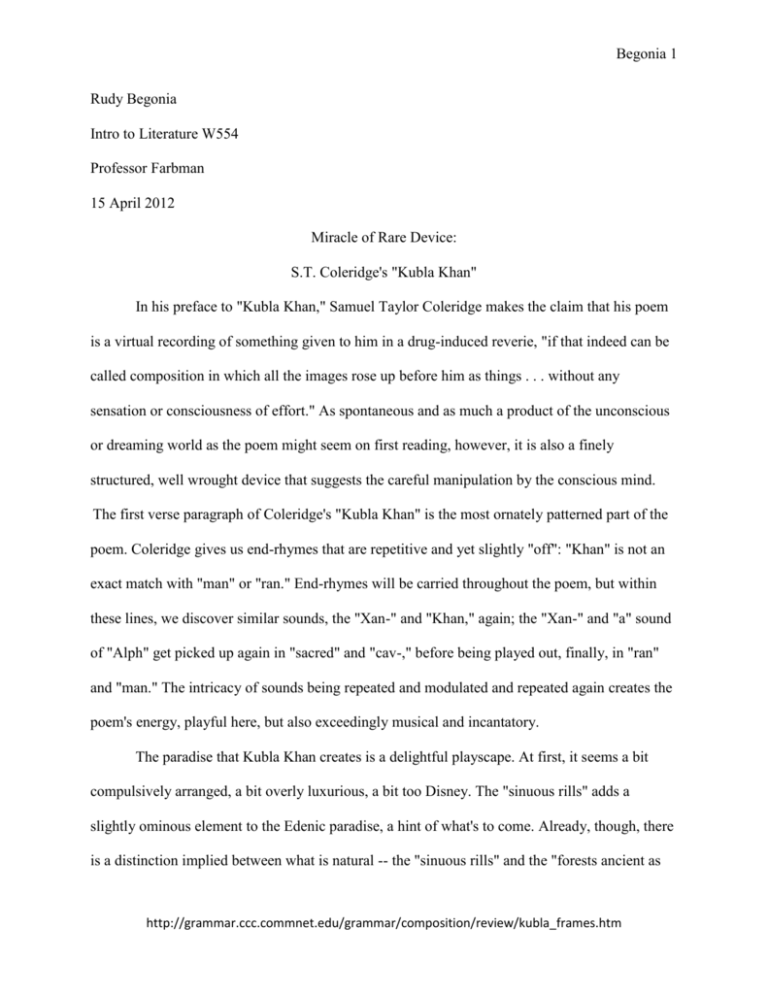
Begonia 1 Rudy Begonia Intro to Literature W554 Professor Farbman 15 April 2012 Miracle of Rare Device: S.T. Coleridge's "Kubla Khan" In his preface to "Kubla Khan," Samuel Taylor Coleridge makes the claim that his poem is a virtual recording of something given to him in a drug-induced reverie, "if that indeed can be called composition in which all the images rose up before him as things . . . without any sensation or consciousness of effort." As spontaneous and as much a product of the unconscious or dreaming world as the poem might seem on first reading, however, it is also a finely structured, well wrought device that suggests the careful manipulation by the conscious mind. The first verse paragraph of Coleridge's "Kubla Khan" is the most ornately patterned part of the poem. Coleridge gives us end-rhymes that are repetitive and yet slightly "off": "Khan" is not an exact match with "man" or "ran." End-rhymes will be carried throughout the poem, but within these lines, we discover similar sounds, the "Xan-" and "Khan," again; the "Xan-" and "a" sound of "Alph" get picked up again in "sacred" and "cav-," before being played out, finally, in "ran" and "man." The intricacy of sounds being repeated and modulated and repeated again creates the poem's energy, playful here, but also exceedingly musical and incantatory. The paradise that Kubla Khan creates is a delightful playscape. At first, it seems a bit compulsively arranged, a bit overly luxurious, a bit too Disney. The "sinuous rills" adds a slightly ominous element to the Edenic paradise, a hint of what's to come. Already, though, there is a distinction implied between what is natural -- the "sinuous rills" and the "forests ancient as http://grammar.ccc.commnet.edu/grammar/composition/review/kubla_frames.htm Begonia 2 the hills" -- and what is clearly man-made, nature bent to mankind's service: the enfolded "sunny spots of greenery," the various gardens and perhaps even the incense-bearing trees (that seem somehow unnatural here, compared to the forests). The whole thing is "girdled round," with the walls and towers of Kubla Khan's fancy. Nature is controlled, set apart; pattern and order have been asserted and established as supreme. The first line of the second stanza -- "But oh! that deep romantic chasm which slanted" -carries an extra half-beat; the easy rhythms and order of the first paragraph are upset as we move into "A savage place" or begin to recognize the place for what it really is, beneath the surface. We become more and more aware of contradictions being held together: the contrasting ideas of nature and artifice of the first stanza, the holy and enchanted (the sacred and the pagan). The sacred river, Alph, takes on its own voice in the following lines: And from this chasm, with ceaseless turmoil seething, As if this earth in fast thick pants were breathing, A mighty fountain momently was forced: Amid whose swift half-intermitted burst Huge fragments vaulted like rebounding hail. The production of sounds has become difficult, forced, like giving birth to something: "forced" and "burst." The last line of this sentence begins with a spondee "HUGE FRAGments," two hard stresses, and the line breaks down in harsh, diphthong sounds: "vaulted like rebounding hail." The river's rapids create the "dancing rocks," as we see in another contrast of elements -- moving water and rocky earth -- the contrast again of art (in the dance) and nature (in the violent http://grammar.ccc.commnet.edu/grammar/composition/review/kubla_frames.htm Begonia 3 splashing of water). This is the paradox of the river, that in its eternal movement it creates the artistic moment: perpetual energy frozen perpetually in time. With the soft, mellifluous "m" sounds of "five miles meandering with a mazy motion" (which will be picked up later on in "mingled measure"), we return to the easy movement of the poem's beginning. In the midst of Kubla Khan's peaceful vision, though, he always hears the tumult of the river sinking toward the sea (which lives at the base of everything), and in that tumult "Kubla Khan heard from far / Ancestral voices prophesying war!" Kubla Khan has walled himself off in his self-created Eden, yet the friction between what is natural and what is art creates a sound (the river's roar) that speaks to him of what is outside his little heaven: man's primordial urges toward war, the destructive element. Again, we see the principle of order versus disorder: the peace within Khan's paradise and the vision of horror outside. The paradox of Khan's creation is finally characterized in this middle stanza as a "miracle of rare device / A sunny pleasure-dome with caves of ice!" There is the ultimate paradox and oxymoron. The "sunny pleasure-dome," made according to Khan's masterplan (the "rare device"), seems like a toy on the mere surface of things; beneath it, within it, are the realities, the deep "caves of ice." Khan's creation thus contains opposite, disparate energies: what man can control and what he can't, the product of his conscious mind and conniving on one hand and the subconscious urges buried within the imagination (uncovered, perhaps, by opium-induced reverie?) on the other. The narrator of the piece is introduced at the beginning of the final stanza as the speaker describes a vision "once I saw." The feminine artist, the "damsel with a dulcimer" contains both the primal energies of the "woman wailing for her demon-lover" mentioned before and the control of art, the "dulcimer." She sings of Mount Abora, which is where Milton located his http://grammar.ccc.commnet.edu/grammar/composition/review/kubla_frames.htm Begonia 4 paradise: the poem is, again, about creation, the birthing place. The narrator longs for the sound that he had heard once "in a vision" (but which is closed off to him now?). The verbs of this sentence are conditional: "Could I revive within me / Her symphony and song, / To such a deep delight 'twould win me," for this is wishful thinking at this point. Again there are contrasts within the narrator's wishing: the "symphony" suggests majesty, order, harmony among parts; the "song" suggests something unto itself, the solitary "Abyssinian maid" singing for her own delight simply because she likes the sound of it. Also the joy he would feel would be "a deep delight": "delight" is the surface element, the "pleasure dome"; the "deep" is the caverns, the caves of ice. The speaker of the poem proclaims that if he could only hear this maid's song, he would build "that pleasure dome" -- which is, at once, the creation of Kubla Kahn and the poem that is in the process of being built, and he would build it "with music loud and long." (Note how the long vowels suggest the kind of music he has in mind and how the pronouns create a sense of insistence and specificity -- "that dome," "those sunny caves.") The sunny dome is a creation of the poem's breath, the "dome in air," holding the twin opposites of being together: "That sunny dome! those caves of ice!" The speaker becomes the artist, the architect-genie of Kubla Kahn, and the beholders (readers) of the genius and poet-speaker see him as both madman and prophet: And all should cry, Beware! Beware! His flashing eyes, his floating hair! Weave a circle round him thrice, And close your eyes with holy dread, For he on honey-dew hath fed, And drunk the milk of Paradise. http://grammar.ccc.commnet.edu/grammar/composition/review/kubla_frames.htm Begonia 5 The vision of the poet is not just a private matter: "all who heard" and "all should cry." It is a collective enchantment with the poet at the center of it. The magic of the final spellbinding lines -- beyond explication -- is based partly on abracadabra incantation ("Weave a circle round him thrice") and our corporate recollections of holy visionaries. The poet compels the vision of the public, but at the same time he is an outcast among them -- untouchable and even cursed ("his flashing eyes, his floating hair!") by his gift. The lines become completely suggestive in their wild blend of holiness, sensuality, prophecy, and danger. The poet and poem have become their own "miracle of rare device," and the reader has borne witness to the creative miracle. http://grammar.ccc.commnet.edu/grammar/composition/review/kubla_frames.htm
